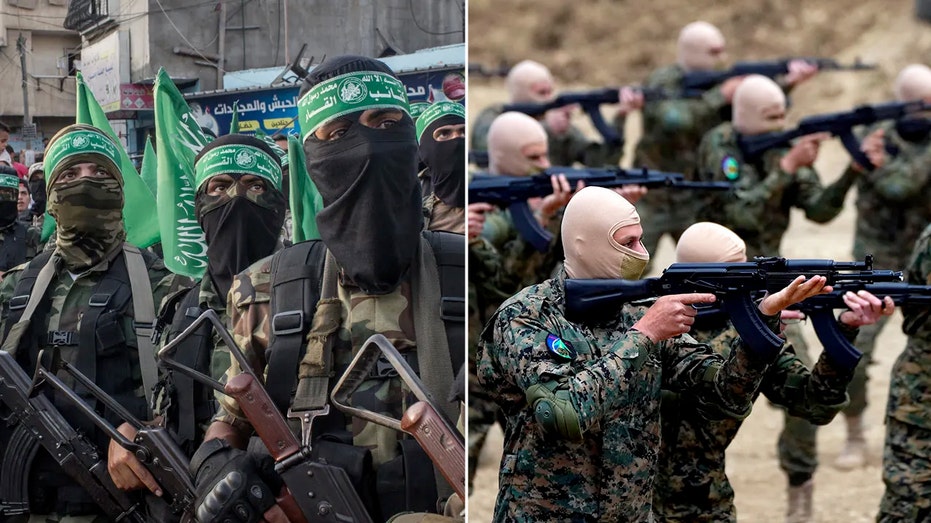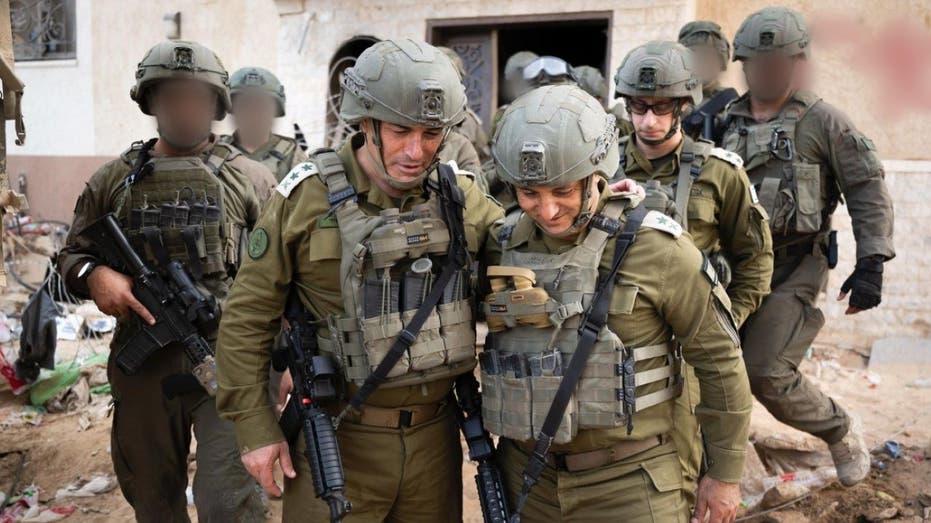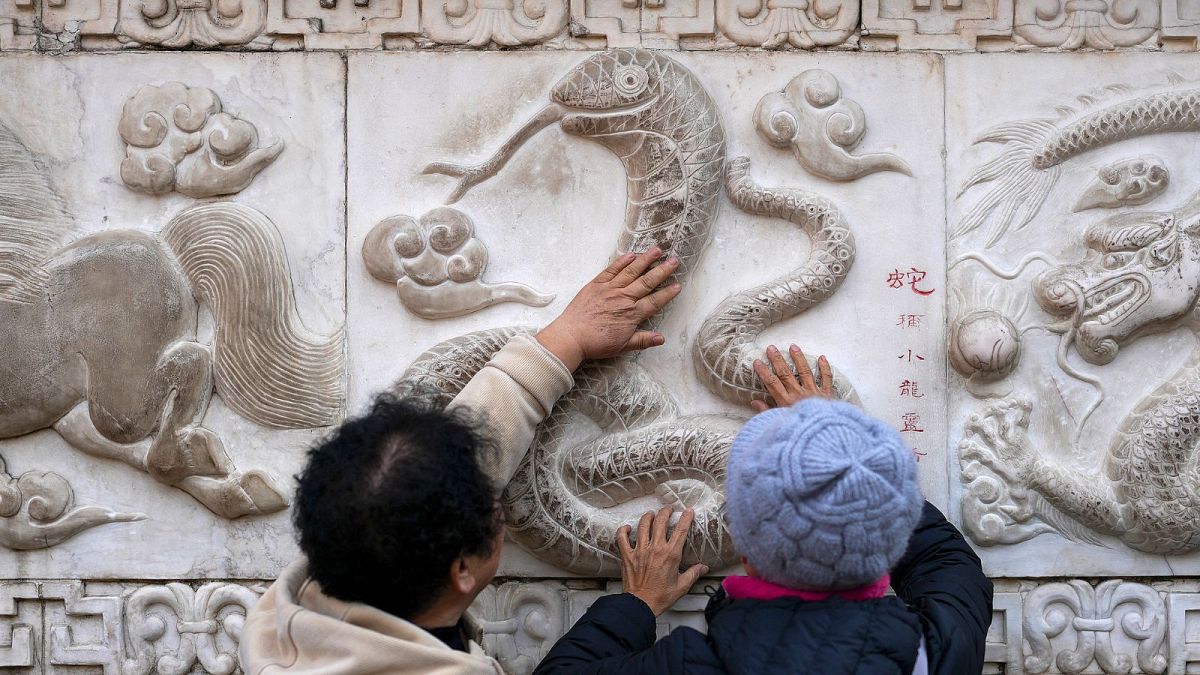Hezbollah bigger challenge than Hamas to Israel: ‘Crown jewel in the Iranian empire of terror’
As Israel gears up for a third war against Hezbollah, experts on the Hamas and Hezbollah alliance outline the similarities and differences between the two Islamist terrorist movements

JERUSALEM — With Israel on the verge of a third full-blown war against Hezbollah because of the Lebanese organization’s constant firing of deadly missiles, drones and rockets, the differences and similarities between Hezbollah and Hamas are now under the microscope.
The Islamic Republic of Iran finances the Mideast terrorist movements Hamas and Hezbollah, who have declared war on Israel and who are also responsible for committing numerous terrorist attacks against American civilians and military service personnel.
Fox News Digital contacted experts for a tale-of-the-tape analysis on Hamas, which is situated in the southern Gaza Strip, and Hezbollah, which is the de facto ruler of the Lebanese state on Israel’s northern border. Israel has fought two wars against Hezbollah, in 1982 and in 2006.
"Hezbollah is the crown jewel in the Iranian empire of terror and evil and is by far the most powerful Iranian proxy equipped with nation state capabilities and even with more firepower than several European militaries have today," Jonathan Conricus, senior fellow at the Foundation for Defense of Democracies and a former IDF spokesman told Fox News Digital.
HEZBOLLAH TERRORISTS LAUNCH MASSIVE ROCKET ATTACK ON ISRAEL AMID MOUNTING TENSIONS
Despite widespread poverty and economic instability in Iran, the Islamic Republic is also a generous funding source of Hezbollah, providing the Lebanese terrorist organization with over $700 million a year, according to the Israel Defense Forces and the U.S. State Department. Joint military cooperation between Iran’s regime and Hezbollah has been a longstanding feature in Lebanon, Syria and throughout Europe with respect to terrorism and war planning.
"In a military comparison, Hezbollah is far more powerful than Hamas across the board in every military metric. In terms of the amount of rockets they have, the range, the accuracy or the payload or size of the warhead, also in terms of the amount of personnel, armed fighters, their training and their equipment," Conricus added.
Hezbollah has amassed a massive arsenal of an estimated 150,000 rockets and missiles that are aimed at the Jewish state. The IDF has degraded Hamas’ supply of 20,000 rockets and missiles since the start of the war. However, Hamas was capable of launching eight rockets from the city of Rafah into Israel two weeks ago. Fox News Digital reported last week that Hezbollah launched over 200 missiles, rockets and drones into Israel.
The economics of Hamas and Hezbollah have similarities and differences in the scope of funding and military training from Tehran.
"Hezbollah and Hamas are both terror organizations funded mainly by Iran. Hezbollah’s loyalty is only to Iran. Hamas is for everyone who helps it," said Edy Cohen, a Lebanese-born Israeli scholar of Hezbollah.
HEZBOLLAH BOMBARDS ISRAEL WITH ROCKETS, DRONES
Cohen, a researcher at the Eitan, the Israeli Center for Grand Strategy, said "Hamas is under a sea blockage and cannot fly to other countries and cannot receive goods or arms easily. Hezbollah can."
The number of terrorists fighting for both organizations varies. The IDF has reduced Hamas’ terrorist force by nearly 50% since the start of the war to between 9,000 and 12,000 combatants.
"Under the guidance of Hezbollah leader Hassan Nasrallah, the group boasts a troop strength of 20,000 to 25,000 full-time fighters, with additional tens of thousands in reserves," the IDF wrote on its website. "Hezbollah's elite Radwan Unit is particularly noted for its combat proficiency and strategic importance in conflicts across the region. This particular unit … was established with assistance from Iran’s Quds force."
Walid Phares, co-president of #EducateAmerica and a professor of Middle East Studies, told Fox News Digital the first principal difference between Hamas and Hezbollah is "Hamas comes from the Muslim Brotherhood organizationally and ideologically, so it is a Sunni extremist group, a chapter of Ikhwan among many chapters in the region."
Ikhwan is an Arabic word for the Muslim Brotherhood.
He added that "Hezbollah comes from an opposite side. They are Shiites, but Jihadi Shiites, made of Lebanese Shia Islamists who have been recruited (and funded) by the Islamic Revolutionary Guard, or the Sepah Pasdaran as early as 1980. They were launched by the Islamic Republic in northern Bekaa that year and marched south all the way to the southern suburb of Beirut and then to the south after Israel started to withdraw."
ODDS OF ISRAEL-HEZBOLLAH WAR 'INEVITABLE,' EXPERTS FEAR: 'TOTALLY PESSIMISTIC'
Phares, co-host of the popular "War and Freedom" podcast, said Hamas’ "ultimate goal is to destroy Israel, establish a Taliban-like emirate or state in Palestine, but, more importantly, have that Islamic entity join a new Caliphate across the region. Hamas as such is not a ‘nationalist’ group, but a Pan-Islamist organization."
In contrast to Hamas, Phrase noted that Hezbollah believes "in exactly the doctrine of the Iranian regime. That is to establish a Khomeinist republic in Lebanon to join the sister Islamic Republic in Iran, and also in Iraq and Yemen, and eventually form a ‘parallel’ Shia Khomeinist (Jihadist) type of Caliphate, known as Imamate, Shia Islamists reject the Sunni Caliphate."
The Islamic revolutionary Ayatollah Ruhollah Khomeini founded the Islamic Republic of Iran in 1979, with a mission to export his Shia Islamism across the world.
"So, they are at polar opposites ideologically, how did they come together and what is common between them. What is common is, first, that they both want to destroy the Zionist entity [Israel]. That’s the ultimate joint goal. Then, they both want to bring down all Arab regimes who are with peace or are obstructing their jihad. They are both enemies of America," Phares said.
The Iranian regime's financing of both terrorist movements is a crucial factor, according to Mideast experts, in understanding jingoism in the region and the destabilization of the Levant and the Islamic heartland in the Middle East.
Qatar hosts the Hamas political leader Ismail Haniyeh, who told the Qatari-owned Al Jazeera network in 2022— two years before Hamas launched its Oct. 7 invasion into southern Israel — that Tehran funnels at least $70 million to Hamas each year.
"Iran stands at the forefront of supporting the cause and [the] people of Palestine," Haniyeh said in March.
The intense relations between Hamas and Hezbollah stem from the mid-1990s.
Counterterrorism expert Bruce Hoffman also noted in a June 14 article on the website of the Council of Foreign Relations that "some five hundred Hamas fighters were trained in Iran in preparation for the October 7 attacks, a reflection of Iran’s longstanding support of Hamas."
Phares explained that Hamas and Hezbollah came together in 1994-1995 when "hundreds of Hamas cadres and leaders were exiled by Israel to south Lebanon. They were hosted by Hezbollah, who linked them up with the regime in Tehran. They were received, funded and armed. They were told the two Jihadisms can work together despite the Sunni and Shia divide. "
He said Hamas embraced the Shia side to the "point that in 2011 they eventually sided with [Syria President Bashar] Assad's (pro-Khomeinist) regime against Sunni Salafi Jihadi factions. That was a major crisis for Hamas, accused by Sunnis of betraying them. But, eventually, when Assad regained ground in Syria, and the Islamic Regime shifted the fight to Gaza, Hamas regained ‘Jihadi notoriety’ in the region."
"Strategically speaking, Hezbollah is currently enjoying a situation where it has Israel exactly where it wants it. And Israel has indeed achieved quite a lot of military achievements. But, on the strategic level, Hezbollah is benefiting from an attrition in Israeli capabilities and from a very challenging diplomatic situation," Conricus, the former IDF spokesman, noted.
"As long as the international community fails to understand the severity and acts with urgency in order to facilitate a diplomatic deal that will return Israeli civilians to their homes safely, the only other option that remains is the military one, which Israel, unfortunately, will have to use in order to implement the responsibility of any government to safeguard the lives of its civilians. I hope that can be avoided, but currently that does not seem to be the case."
The U.S. has sanctioned both Hamas and Hezbollah as foreign terrorist organizations. The EU has merely sanctioned Hezbollah’s so-called "military wing," a terrorist entity, while France has blocked the designation of a full terror proscription of Hezbollah. The EU sanctioned Hamas as a terrorist organization in 2003.
What's Your Reaction?
















